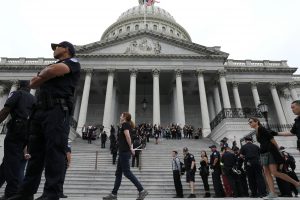
By Richard Cowan, Amanda Becker and David Morgan
WASHINGTON (Reuters) – A deeply divided U.S. Senate on Saturday confirmed Brett Kavanaugh to the Supreme Court, as Republicans dismissed sexual assault accusations against the conservative judge and delivered a major victory to President Donald Trump.
By a vote of 50-48, the Senate gave a lifetime job to Kavanaugh, 53, after weeks of fierce debate over sexual violence, privilege and alcohol abuse that convulsed the nation just weeks before congressional elections on Nov. 6.
Kavanaugh will be sworn in almost immediately on Saturday by Chief Justice John Roberts, according to a statement from the court.
The Senate vote takes the highest U.S. court down a more conservative path perhaps for many years and is a bitter blow to Democrats already chafing at Republican control of the White House and both chambers of the U.S. Congress.
Adding to the drama, women protesters in the Senate gallery shouting, “Shame on you,” briefly interrupted the start of the final confirmation vote on Saturday afternoon.
Kavanaugh’s nomination became an intense personal and political drama when university professor Christine Blasey Ford accused him of sexually assaulting her when they were high school students in a wealthy suburb of Washington in 1982.
Two other women accused him in the media of sexual misconduct in the 1980s.
Kavanaugh fought back hard, denying the accusations in angry and tearful testimony before the Senate Judiciary Committee that was viewed live on television by around 20 million people.
Trump stood by Kavanaugh, a federal appeals court judge with a history of advancing Republican causes, and this week mocked Ford’s account of what she says was a drunken attack on her by Kavanaugh when they were teenagers.

U.S. Capitol Police arrest protesters from the steps of the Capitol in the hours ahead of a scheduled U.S. Senate vote on the confirmation of Supreme Court nominee Judge Brett Kavanaugh in Washington, U.S. October 6, 2018. REUTERS/Jonathan Ernst
TRUMP TWEET
Trump, seeking a legacy as the president who put a strongly conservative stamp on the court, praised the Senate for its vote.
“I applaud and congratulate the U.S. Senate for confirming our GREAT NOMINEE, Judge Brett Kavanaugh, to the United States Supreme Court,” Trump wrote on Twitter. “Later today, I will sign his Commission of Appointment, and he will be officially sworn in. Very exciting!” he wrote.
Hundreds of protesters against Kavanaugh gathered on the grounds of the Capitol and at the Supreme Court. A total of 164 people were arrested in the protests, U.S. Capitol Police said.
A townhouse near the Washington residence of Republican Senator Susan Collins, whose backing for Kavanaugh helped get him over the line on Saturday, flew the flag of her home state Maine upside down in protest.
The confirmation allows Trump to hit the campaign trail ahead of the congressional elections saying that he has kept his 2016 promise to mold a more conservative American judiciary.
Democrats said Kavanaugh’s partisan defense of himself, in which he said he was victim of a “political hit,” was enough itself to disqualify him from the court.
Repeatedly during the Senate debate, Republicans accused Democrats of staging a “smear” campaign against Kavanaugh to prevent a conservative becoming a Supreme Court justice.
The accusations against Kavanaugh energized the #MeToo social media movement that emerged after high-profile accusations of sexual assault and harassment by men in politics, the media and the entertainment industry.
Kavanaugh’s confirmation gives conservatives a solid 5-4 majority in any future legal battles on contentious issues such as abortion rights, immigration, transgender rights, industry regulation, and presidential powers.
The dispute over Kavanaugh has added fuel to campaigning for the elections in November when Democrats will try to take control of Congress from the Republicans.
Several polls show that Republican enthusiasm about voting, which had lagged behind, jumped after the Kavanaugh hearing last week.
Senate Republican leader Mitch McConnell told Reuters that the political brawl over Kavanaugh will help Republicans at the elections.
“Nothing unifies Republicans like a court fight,” McConnell said in an interview ahead of the vote. “It’s been a seminal event leading into the fall election.”
But Democrats hope women angered at the Kavanaugh accusations will turn out in large numbers to vote out Republicans.
During Saturday’s vote, senators were showered with cries of “We will not forget,” and “Survivors vote” from protesters in the Senate gallery.
(Reporting by Amanda Becker, Richard Cowan and David Morgan; Additional reporting by Ginger Gibson and David Brunnstrom; Editing by Alistair Bell)





